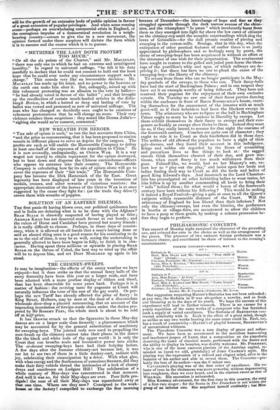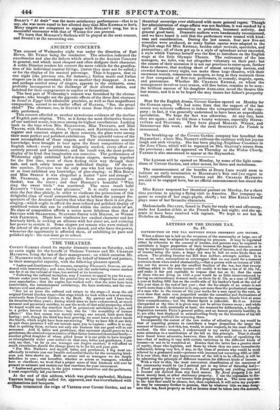PHILHARMONIC CONCERTS.
THE concert of Monday night sustained the character of the preceding one, and evinced due care in the choice as well as the arrangement of the pieces. The presence of two eminent foreign performers was a fortunate chance, and contributed its share of interest to the evening's entertainment.
FOURTH CONCERT—MONDAY, MAY 2.
ACT I.
Sinfonia in D HATON. Duet, Miss DoLay and Mr. STRE1TON, " Dear child of hope" (Joseph) MEHOL. Conceit°, Pianoforte, Mr. rammer BEETHOVEN. Scene, Miss A. IC ESIBLE, Wienahte mir der Schlummer " (Dec Freischutx WEBER. Overture, Euryant he WEBER.
ACT U.
Sinfonia in F Brirrnosztr. Aria. Miss DOLBY, "Al desio " MOZART. Fantasia, Clarionet, Signor CavALutit CAVALLINI. Duet, Miss A. KEMBLE and Miss DoLey, '• Come, be gay"
(Dec Freischutz) Wrenn.
Overture, Les Dear Jemmies Ceincemr.
Leader. Mr. F. Cassica—Conductor. Mr. Lucas.
Our suggestion respecting HAYDN'S Sinfonias has not been unheeded: at any rate, the Sinfonia in D was altogether a novelty, and as fresh and blooming as in the days of its youth. We hope the success of this experiment will lead to further research. There is no excuse for a yearly repetition of the same works of a composer who has furnished such a supply of varied excellence. The Sinfonia of BEETHOVEN con- trasted admirably with it. Each is the effect of a great mind, though as unlike as any two works bearing the same name could be. Each, too,. has a touch of eccentricity—ILLYDreS of playful humour, BEErsovax's of unrestrained wildness.
The Pianoforte Concerto was a rare display of grace and refine- ment. We have been so accustomed to the merciless hammering and incoherent jargon of LIZST, that a composition on the pianoforte deserving the name of classical music, performed with the desire and the ability to display its beauties, was doubly welcome. Mr. PIRKHERT, who is one of the most eminent pianists of the Austrian capital, re- minded us (need we add, gratefully) of JOHN Casissa's style. His playing was the expression of a refined and elegant mind, alive to the beauties of his author and able to reveal them. The Concerto—pro- bably the best of its author—was the C minor one.
CeveLtasn's playing was of the first order of excellence. His vo- lume of tone in the chalameau was more powerful, without degenerating into roughness, than we ever heard, and in the clarinet sweet as that of WiLmassi. His execution is unbounded.
Miss KESIBLE adventured, for the first time in this country, the song of a first-rate singer ; for the Scena in Der Freischutz is not within the grasp of an inferior one. She acquitted herself creditably, but Miss
Dorosv's "Al deair" was the more satisfactory performance—that is to say, she was more equal to her allotted duty than Miss KEMBLE to her's. Many singers are competent to engage with MOZART'S song, but to a successful encounter with that of WEBER few can pretend.
We learn that MOLIQUE'S Sinfonia will be played at the next concert, and SPOHR'S at the succeeding one.



























 Previous page
Previous page